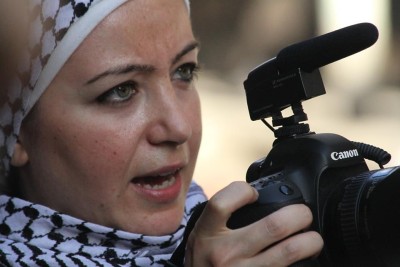I can still picture the scene at my grandfather’s house in Syria in the summer of 2002.
Sitting between my two aunts silently, my head down, I listened as they preached at me about the “sin” I was committing. “A Journalist!” one shouted in condemnation while hitting her chest with the palm of her hand.
The other spoke with a calmer tone, “My daughter, don’t you care about our reputation? Are you that selfish? You know that you are bringing shame to your family? Women can’t be journalists.”
I was 17 years old, had just finished my science baccalaureate and passed the first test to become an architect at Aleppo University. Instead, I decided to take another path.
At the time, I was the only girl from Idlib, a city in the country’s north-west, to study journalism at Damascus University, the only media faculty in Syria. Some say I was the first from the province to do so and to work as a journalist after graduation. There were records of a couple of women who had studied journalism but worked as elementary teachers afterwards. Apparently, that was seen as a more acceptable role for the women in my community.
My mother told me, “You can be whatever you want, but you should get ready to deal with the consequences.” I said I was ready but I never imaged that those could include facing the death penalty and dealing with the constant fear that has haunted my career.
Nothing stayed the same since that summer day in 2002. My grandfather’s house was burnt to the ground by regime forces in 2012 as a punishment for my family’s involvement in the uprising. My mother has had to face the consequences of my work as a journalist, again and again. My aunts, who are refugees in different continents, have also changed, becoming the first to celebrate my accomplishments in journalism.
Since the beginning of my career in 2006, I’ve been driven by human rights and gender equality. Most of the pieces I produced while living in Damascus were related to the discriminatory Syrian personal statute laws, early marriages, and gender-based violence.
But then war came, and by 2013 my role was transformed to that of war reporter as violence engulfed my home. I chose to live in rebel-held areas under indiscriminate bombing, a safer alternative for an independent journalist than being tortured in the regime’s prisons.
But my ability to report freely didn’t last. I didn’t have the privilege that international journalists enjoyed of going home after reporting their stories objectively and professionally. I was home and the story was my story.
I decided to bear witness to the extra difficulties women face within our conflict because of their gender, examining their marginalised stories and side-lined rights. As my freedom of expression diminished in favour of self-censorship, I stopped producing content. I was training, supporting and mentoring other journalists but not reporting myself.
To remain sane, I created a file titled “not to be published”. In it, I wrote down everything that was happening, with dates, full names, as if I was reporting these suppressed facts to undefined audiences in an unknown time. Perhaps they would read it when I was killed or kidnapped. I was now a reporter of history.
Forced to leave the rebel-held area in 2015 after publicly voicing my support for the Charlie Hebdo magazine journalists who were murdered in Paris, I lived in southern Turkey for almost two years, before moving to the UK. But I still found myself unable to report freely on Syria even though I had left the country.
In 2016, for example, pro-opposition activists attacked and bullied me when I published a piece highlighting violations committed against civilians by the opposition.
That was the first of many campaigns against me. Another was launched when I published an article with openDemocracy about secular activists attacking feminists.
It took me years to realise how populism and polarisation have silenced me, too: realising how traumatising it had been only when I began writing again last year.
My friends who saw me after my article was published told me I looked “different and lighter”. Nothing had changed in my life, except that I had returned to being a journalist.
After 15 years of my career, it is only this year I realised that being a journalist has become a central part of who I am.
Published in Open Democracy on the World Press Freedom Day
